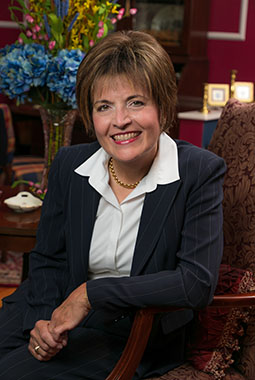NCH specialists deliver individualized treatment to fallopian tube cancer patient
September 25, 2017

In March 2015, Camille Snyder was feeling perfectly healthy. She was juggling a part-time job and college courses, taking vitamins and feeling great. But a trip to the restroom where she discovered a bit of spotting alerted her that something was wrong. She called Gynecologist Lori Anderson, M.D., who performed an exam, a vaginal ultrasound and blood tests. Camille had suspicious tumors on both ovaries and cancer cells on her fallopian tubes. She was diagnosed with stage III fallopian tube cancer.
From physician appointments and surgery to chemotherapy and follow-up visits, Camille says she was comforted throughout the process by a hospital that felt more like a hotel and physicians who were more like friends.
“I just can’t say enough about these women physicians and specialists at Northwest Community Healthcare (NCH),” says Camille, a 56-year-old Palatine resident. “They treat you like an individual for such a large institution.”
A team approach to wellness

Dr. Anderson referred Camille to Michelle Luthringshausen, M.D., NCH’s Director of Robotics and an Obstetrician/Gynecologist, who discussed the possibility of robotic surgery. It was determined the best approach would be a radical open surgery performed by S. Diane Yamada, M.D., NCH Medical Group Gynecologic Oncologist and Professor and Section Chief of Gynecologic Oncology at University of Chicago Medicine. Dr. Yamada removed a 10-centimeter tumor involving her pelvis and then enlisted the help of John Edwards, M.D., NCH Medical Group Vascular Surgeon, who removed an enlarged lymph node in a difficult place.
“Our goal with these patients is to leave them with no visible cancer at the end of the surgery,” says Dr. Yamada. “That’s what’s been shown to correlate with better survival rates for patients, so that’s what we were able to do in conjunction with Dr. Edwards.”
Camille then underwent aggressive intraperitoneal (“abdominal wash”) chemotherapy, but based on side effects, Dr. Yamada adjusted it to a lower yet still effective intravenous dose.
“As a physician, oncologist and surgeon, it’s critical for me to evaluate my patients on an ongoing basis as they go through their chemotherapy to see what we can do to adjust treatment while maintaining effectiveness,” Dr. Yamada says.
NCH was the right choice for Camille because she was comfortable with her team of doctors, which also included Rebecca Brooks, M.D., Medical Director of NCH’s Gynecologic Oncology Program and Associate Professor and Gynecologic Oncology Fellowship Director at University of Chicago Medicine, and Urszula Sobol, M.D., Hematologist/Medical Oncologist.
“They worked together as a team beautifully,” Camille says. “Notes were transcribed and where one left off, the other one was picking up and reiterating the conversation amongst the team.”
Dr. Yamada credits Dr. Sobel with being instrumental in spearheading communication.
Supportive staff throughout treatment and follow-up
Camille recalls how office staff members, especially Ellen Roy, PA-C, Gynecologic Oncology Physician Assistant, were quick to report test results, even though she could have accessed the results herself using the NCH Patient Portal. And nothing could beat the bedside visits Dr. Yamada paid her during chemotherapy. Additionally, Camille is appreciative of the many details taken care of by NCH’s inpatient nursing staff during her hospitalization following surgery.
“It was the little things – the nice hot baths that they give you, anything I needed; the shift changes where the nurses were introducing themselves, taking my temperature, making sure I was comfortable,” Camille says. “Even though it is a hospital, it felt like a boutique hotel.”
Today, Camille is enjoying her life. She works full time as a sales manager, and she’s back to the hobbies she loves: shopping, gardening and decorating. Camille says she’s thankful for the excellent care she received, and continues to receive in her follow-up visits at NCH.
“There are very good surgeons and doctors on board at NCH,” Camille says. “One would think you’d have to go to the city to have this level of care, but here it is in the suburbs.”
Be a proactive patient like Camille
- If you have symptoms that are out of the ordinary, see your physician and encourage him or her to order an ultrasound.
- Ask questions.
- Make sure you’re comfortable with your care.
- Choose a high-volume hospital with a multidisciplinary team like NCH.
“We partner with fantastic medical oncologists and now that we have Insight genetic counseling services, the workload to get patients tested in a timely manner and get good information back to them is key,” Dr. Yamada says.
Camille was diagnosed with a RAD51C gene mutation. Her family members can be tested to see if they have the mutation, which makes a patient more susceptible to both breast and ovarian cancer.